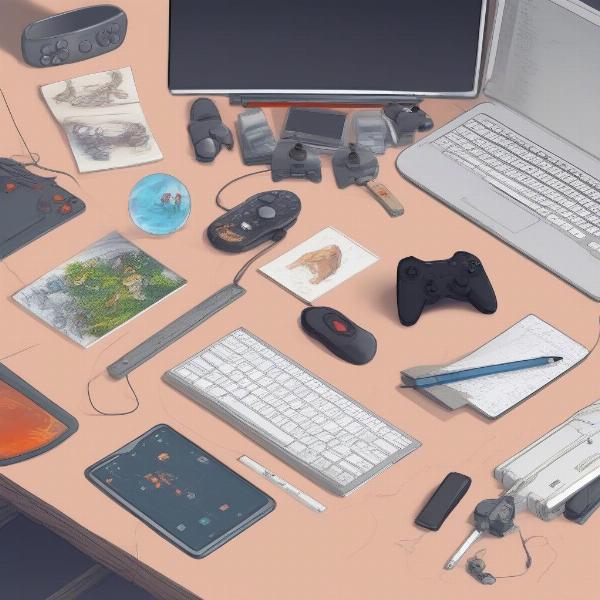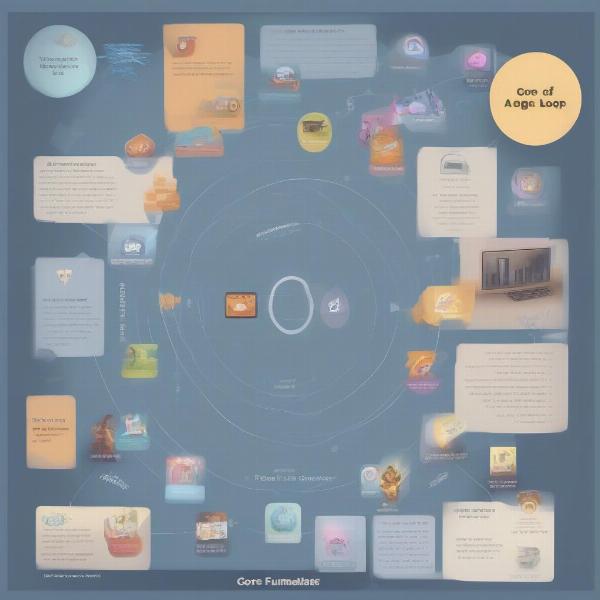The question “How Can I Make A Game” is a common one for aspiring game developers. At SupremeDuelist.blog, we understand that the path to creating your own game can seem daunting, but it’s also an incredibly rewarding journey. This guide will break down the process into manageable steps, exploring various options and tools to help you bring your game ideas to life. From initial concept to final polish, we will cover the core aspects of game development.
This article will provide a comprehensive look at the essential considerations when starting your game development journey, guiding you through the different approaches and resources available, regardless of your technical background. Whether you dream of crafting a complex RPG or a simple puzzle game, we’ll help you take those first crucial steps.
Where to Begin Your Game Creation Journey?
The first step in answering the question “how can I make a game?” is to solidify your concept. This doesn’t mean you need a fully fleshed-out game design document, but having a clear idea of what kind of game you want to make is crucial. What genre excites you? Are you interested in fast-paced action or strategic puzzles? Consider the following:
- Genre: Do you want to create a platformer, a role-playing game (RPG), a puzzle game, a strategy game, or something else entirely?
- Gameplay: What is the core loop of your game? What will players be doing most of the time?
- Target Audience: Who are you making this game for? Kids, adults, casual gamers, hardcore players?
- Scope: It’s best to start small. Don’t aim to create the next Grand Theft Auto for your first game. Begin with a simple concept that you can realistically achieve.
Choosing Your Tools and Technology
Once you have a solid idea of your game, you’ll need to select the right tools. The technologies and platforms available can seem overwhelming at first, however, they can be divided into a few accessible categories:
Game Engines
Game engines are software frameworks that provide a suite of tools for game creation. They handle many of the technical aspects, allowing you to focus more on the game’s design and logic. Popular options include:
- Unity: A versatile engine suitable for both 2D and 3D games across various platforms. It is beginner-friendly and has a large community for support. Many popular indie games have been made with Unity, showcasing its diverse capabilities.
- Unreal Engine: Known for its high-quality graphics and powerful features, Unreal Engine is often used for more complex projects. It’s a great option if you want visually impressive games, and is also used by major studios.
- Godot Engine: An open-source, free game engine that is excellent for beginners, especially for 2D game development. It’s lightweight, user-friendly, and has a strong community.
- GameMaker Studio 2: Primarily used for 2D games, GameMaker is known for its ease of use and intuitive interface, making it a great choice for beginners. If you are curious about whether can gamemaker make 3d games, it’s important to remember its focus is primarily on 2D game development but it can handle 3D aspects to some extent.
The best engine for you will depend on your game, technical skills, and budget. Each engine has a different learning curve and feature set, and experimenting can help you find the right fit.
Programming Languages
If you want more control over your game, or if you plan to develop your engine, you will need to use a programming language. Some popular choices for game development include:
- C#: Commonly used with Unity. It’s a robust and versatile language suitable for creating complex game mechanics.
- C++: Often used with Unreal Engine, C++ is powerful and allows for very granular control over the hardware, making it the preferred choice for high-performance games.
- Python: Known for its readability and ease of use, Python can be used to create simple games using libraries such as Pygame. If you are wondering if can you make games with python, the answer is yes, but it’s more suitable for smaller and less resource-intensive projects.
 game development tools overview
game development tools overview
Other Essential Tools
Beyond the game engine, you’ll need tools for creating assets like:
- Graphics: Software such as Adobe Photoshop, GIMP (free), or Aseprite are used for creating 2D artwork and sprites. Blender or Autodesk Maya are used for creating 3D models.
- Audio: Software like Audacity (free), Logic Pro, or Ableton Live is used for creating sound effects and music.
Essential Steps in the Game Creation Process
Once you have your concept and tools ready, it’s time to begin the core game creation process. The steps below are a starting point to help you understand the process.
Step 1: Prototyping
Before you fully develop your game, creating a prototype is an essential step. This allows you to quickly test your core mechanics and gameplay loop.
- Simple Mechanics: Create a basic version of your game that allows you to test the core interaction between the player and the game environment.
- Playtest Early: Get feedback from others as soon as possible. It’s crucial to know if your game is fun early on.
Step 2: Game Design and Development
After the prototype, you’ll start fully developing your game, keeping in mind your initial design.
- Iterative Process: Develop your game in small chunks. Don’t try to implement everything at once.
- Core Mechanics: Focus on making your core mechanics as solid as possible before adding additional features.
- Balance: Find the right difficulty curve for your game.
Step 3: Art and Sound Integration
The art and sound of your game will significantly impact player experience.
- Consistent Art Style: Use an art style that is consistent and fits with the genre of your game.
- Immersive Sound: Sound is critical for creating atmosphere and providing important player feedback.
Step 4: Testing and Refinement
Testing is a critical stage of the process, as it allows you to find and fix bugs as well as iterate based on feedback.
- Playtesting: Get as much feedback as possible from different players.
- Bug Fixing: Identify and fix any technical problems.
- Polishing: Make sure all aspects of your game are of a high quality before releasing.
Understanding Game Design Fundamentals
Good game design is crucial for creating engaging and enjoyable games. Here are some fundamental principles to keep in mind:
- Core Loop: The repeated pattern of actions in your game. A good core loop is satisfying and keeps players engaged.
- Player Agency: Players need to feel like their actions matter and impact the game.
- User Experience (UX): Make sure your game is intuitive and easy to navigate.
- Feedback: Provide clear and consistent feedback to players on their actions.
As Mark Johnson, a seasoned indie game designer, puts it, “The best games are those that feel intuitive to play but also contain a layer of complexity that can be explored with time and experience. A good design is as important as good code.” This highlights the importance of balance between technical skill and creative design.
 game design fundamentals visual
game design fundamentals visual
The Importance of a Community
Game development doesn’t have to be a solitary journey. Engaging with other developers is crucial for learning and gaining support. Some things you should consider:
- Online Communities: Join forums, Discord servers, and other online groups to connect with other developers. This includes official Discord for the game engine you are using, or Reddit groups and forum specific to game development.
- Game Jams: Participating in game jams is a great way to practice your skills, meet other developers, and potentially kickstart your own project.
- Feedback: Share your work with other developers and ask for feedback. This will help you identify problems and make improvements.
You will also benefit from joining online communities to expand your network and gain knowledge. This is especially important if you find yourself stuck on a specific mechanic or bug.
Frequently Asked Questions
Here are some frequently asked questions about making games:
What skills do I need to make a game?
You will need a combination of creativity, technical skills, and problem-solving abilities. Depending on your role, you might need to know programming, art, music, or game design, but you do not need to know all of these to get started. You can learn new skills as needed.
Do I need to know how to code?
While programming is certainly an advantage when creating your own games, you can start developing games without knowing code by using game engines with visual scripting systems, like Bolt in Unity.
How much does it cost to make a game?
The cost varies greatly depending on the complexity of the project, if you need assets or music from a third party, and if you are outsourcing aspects of the game development. However, if you create your game by yourself using free software, it can cost nothing, depending on your individual choices.
How long does it take to make a game?
The time it takes varies based on the complexity of your game, your team, and your experience. Simple games may take a few weeks or months, while larger and more complex projects can take years.
Can I sell my game after I make it?
Yes, once you finish your game, you can choose to sell it on different platforms like Steam, Itch.io, or mobile app stores. This allows you to gain an income from your creative endeavor.
Is it better to start with a 2D game or a 3D game?
For beginners, starting with a 2D game is generally recommended, as it’s less complex and requires fewer resources. However, if you are comfortable with 3D modeling and development, you can start there.
Exploring Specific Game Types
Depending on your interests, you might want to delve deeper into particular game types. For instance, if you have a love for tabletop games, you might wonder how can i make a board game. There are distinct aspects to game design in different formats. Similarly, if your interest lies in competitive games, you might be curious about options to create a more strategic environment and even wonder if can you make a healer character in fighging games. It’s important to research specific types of games if you are aiming to create something very specific. Remember that you can always start with smaller projects before jumping into more complicated projects.
The Path of a Game Developer
Making a game is a significant undertaking, but it’s also a very rewarding experience. Game development requires dedication, creativity, and problem-solving skills. As Susan Rodriguez, a veteran game designer, notes, “Game development is a continuous learning process. It’s a marathon, not a sprint.” If you can break the whole process into smaller, more manageable tasks, and commit to learning and improving every step of the way, it’s possible to create the game you always dreamed of. The road to creating great games is paved with practice and perseverance.
Conclusion
So, how can you make a game? The answer, as you can now see, is multifaceted and involves a combination of technical skills, creativity, and a structured approach. At SupremeDuelist.blog, we encourage you to embark on this creative journey, and we hope that this guide has provided you with the necessary insight to begin. We are here to support you with more in-depth guides, so keep an eye out for our future articles to continue your game development journey. By taking the initial steps, learning from every experience, and engaging with the broader game development community, you’ll be on your way to seeing your game ideas become reality. Finally, If you are having troubles with your existing accounts you can also refer to our guide on how can i make a new game center account. Let the games begin!
Leave a Reply